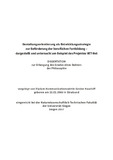Citation link:
https://nbn-resolving.org/urn:nbn:de:hbz:467-12491Files in This Item:
| File | Description | Size | Format | |
|---|---|---|---|---|
| Dissertation_Gesine_Haseloff.pdf | 15.68 MB | Adobe PDF |  View/Open |
| Dokument Type: | Doctoral Thesis | metadata.dc.title: | Gestaltungsorientierung als Entwicklungsstrategie zur Beförderung der beruflichen Fortbildung – dargestellt und untersucht am Beispiel des Projektes VET-Net | Other Titles: | Shaping orientation as development strategy to promote the further education in Vocational Education and Training (VET) - shown and examined on the example of VET-Net | Authors: | Haseloff, Gesine | Institute: | Fakultät IV - Naturwissenschaftlich-Technische Fakultät | Free keywords: | Gestaltungskompetenz, Berufliche Kompetenz, Netzwerkbildung, Berufliche Fortbildung, Subsahara Afrika, Vocational education and training, Shaping competence, Competence, Train the trainer, Further education | Dewey Decimal Classification: | 370 Erziehung, Schul- und Bildungswesen | GHBS-Clases: | OJN QHUP QHYL |
Issue Date: | 2017 | Publish Date: | 2017 | Abstract: | In der Arbeit wird eine gestaltungsorientierte und vernetzte Fortbildung für Berufspädagogen als eine erstrebenswerte Entwicklungsstrategie im Prozess beruflicher Bildung in Sub-Sahara Afrika ausgewiesen. Dies geschieht am Beispiel des Projektes „Fortbildungs- und Forschungsnetzwerk für Berufspädagogen in Sub-Sahara Afrika“ (VET-Net), in dem die Verfasserin mitgewirkt hat. Eine berufswissenschaftliche Position wird als Grundlage für vernetztes Gestalten in der Fortbildung und auch für Lehren und Lernen in der beruflichen Bildung ausgewiesen. Gestalten wird als Grundkategorie, als ein spezielles Handeln beziehungsweise Tätig sein, dargestellt und begründet. In der Folge zeigen sich Gelingensbedingungen für ein erfolgreiches Gestalten. Es zeigt sich auch, dass Gestaltungskompetenz ein Schlüssel ist, mit dem Hochschullehrer im Zusammenwirken mit Lehrkräften in Schulen, Betrieben und anderen Berufsbildungseinrichtungen den Aufbau und die Nutzung eines Fortbildungssystems sinnvoll anstoßen und verfolgen können. Dies weit möglichst selbständig und unter den speziellen Bedingungen, die in Sub-Sahara Afrika gegeben sind. Dazu werden die Entwicklungen in dem Projekt VET-Net analysiert, das zunächst auf die Fortbildungssituationen in Universitäten in Maputo in Mosambik, in Jimma in Äthiopien und in Johannesburg in Südafrika abgestellt. Die empirische Untersuchung macht diese Entwicklung erkennbar. Dafür werden Methoden der qualitativen Sozialforschung eingesetzt: Die Gruppendiskussion in Kombination mit leitfadengestützten Experteninterviews. Durch eine kategorienbasierte inhaltsanalytische Auswertung der erhobenen Daten werden die zuvor gewonnenen Einsichten zur Gestaltungsorientierung als einer Entwicklungstrategie bestätigt und/ oder begründet modifiziert. Als Konsequenz aus den theoretischen Überlegungen und der empirischen Untersuchung wird schließlich ein Modell für ein Train-the-Trainer Fortbildungssystem (TtT-System) für Berufspädagogen vorgeschlagen. In the thesis a shaping oriented and networked further education for VET pedagogues is presented as a desirable development strategy in the process of VET in Sub-Sahara Africa. This is exemplified by the project „Further Education and Research Network for VET Professionals in Sub-Sahara Africa” (VET-Net), to which the author contributed. A scientific position based on vocational sciences is shown as a basis for networked shaping in VET further education as well as for teaching and learning in VET. Shaping is represented and justified as a base category, as a special action or activity. Conditions of success are demonstrated as a result for successful shaping. Also, it is shown that competency in shaping is a key for university lecturers, to initiate and pursue the development and use of a training system usefully - in cooperation with teachers in VET schools, companies and other vocational training institutions and under the specific conditions that are given in Sub-Sahara Africa. The developments in the VET-Net project will be analyzed, focusing on the continuing education situation in universities in Maputo, Mozambique, in Jimma, Ethiopia and in Johannesburg in South Africa. It becomes clear how professional VET pedagogues can develop a desirable shaping competence for the implementation of a further education network. With the help of the empirical investigation the development becomes recognizable. For this, methods of qualitative social research are used: the group discussion in combination with guided interviews with experts. Through a category-based content analysis of the collected data the previously gained insights into the shaping orientation have been confirmed or reasonable modified. As a consequence of the theoretical considerations and the empirical investigation, a shaping and competence oriented further education model for a Train-the-Trainer system (TtT-System) for professional pedagogues is finally proposed. |
URN: | urn:nbn:de:hbz:467-12491 | URI: | https://dspace.ub.uni-siegen.de/handle/ubsi/1249 | License: | https://dspace.ub.uni-siegen.de/static/license.txt |
| Appears in Collections: | Hochschulschriften |
This item is protected by original copyright |
Page view(s)
868
checked on Jan 26, 2025
Download(s)
808
checked on Jan 26, 2025
Google ScholarTM
Check
Items in DSpace are protected by copyright, with all rights reserved, unless otherwise indicated.

